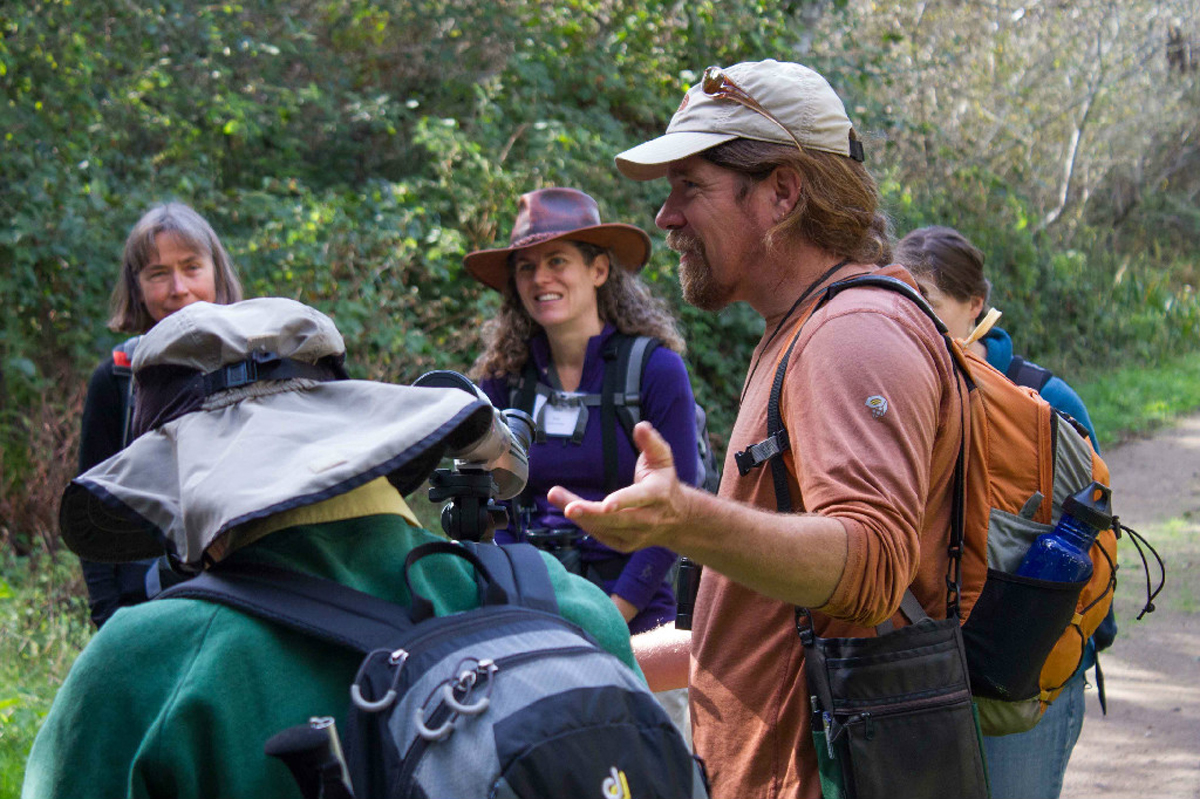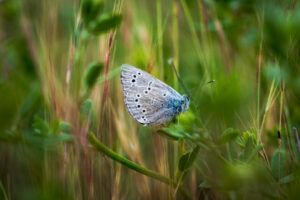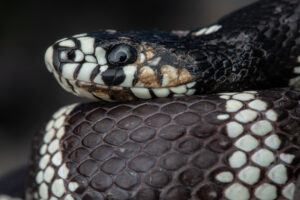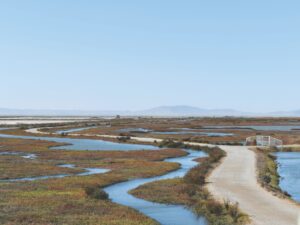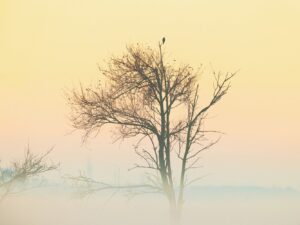What is the meaning of “newing”? Ever heard of “salturn”? How about “beamian”? Northern California naturalist David Lukas’ latest book encourages people to “take back” nature by creating a new lexicon for natural phenomena — with the help of ancient vocabularies. We recently spoke with David about Language Making Nature, published last month.
BN: Are you originally from the Bay Area?
DL: I’m from the Pacific Northwest; I grew up on the coast and went to high school and college in Oregon. I started college, but soon took some time off to come down from Oregon to work with poet Gary Snyder in the Sierra Nevada foothills. Then I returned to Portland to finish my English degree at Reed in 1993.
After graduating I moved back to California to do more naturalist teaching. I taught in Marin, but I was living in the Sierras. It was a really long drive to teach each session.
BN: Why did you return here?
DL: I love being part of the Bay Area community. There’s an amazing diversity of people and organizations that are devoted to nature, reflecting great expertise and passion. I also love the phenomenal natural beauty.
BN: Was there a specific moment that you can recall that sparked your interest in becoming a naturalist?
DL: No. There is no memory that I have of “before” I was a naturalist. From the earliest moments possible, I studied animals, their habitats and the environment around them. My father was a marine biologist and I spend a lot of time playing in his laboratory or accompanying him into the field. The town I grew up in was not very developed, and it was right next to nature: beaches, tidepools, coastal marshes, and estuaries.
BN: What training have you had to be a naturalist?
DL: No formal training; I’m totally self-taught. Reed has a traditional biology program, but I chose to study English instead. I’ve read every book on natural history, every field guide. I started subscribing to scientific journals when I was eight or nine years old. I was really into reptiles and amphibians, so I subscribed to The Journal of Herpetology. I read Darwin when I was nine.
Growing up in a very small town, I was very isolated. I invented the idea of naturalist for myself from scratch, a priori. I had no idea there were people who taught other people about nature, and certainly not as a job. When I was older, we moved to Portland, where I discovered the Oregon Museum of Science and Industry (OMSI), similar to the Exploratorium here. In the basement of the OMSI there was a research laboratory, where I found a group of high school students who were passionate about nature like me. We taught each other, learned from each other, and pushed each other to understand as much about nature as we possibly could. We worked in the lab and took classes and field trips in the area.
Some of the people I met in that program graduated and went into business for themselves, guiding others in nature or offering tours. I went along on many of those trips, and eventually, I started doing that myself.
BN: You’ve written several books, including several field guides. Just last month you published your newest book, Language Making Nature, which is a different kind of work. What is the gist of your new book?
DL: It’s a handbook of tools and insights into how to create words for speaking about the natural world. There are seventy-six sections in the book, and in each section I’ve tried to give an example of things that have shaped the English language. For example, English words are subject to “metathesis”, a technical term which means that two adjacent sounds switch with each other. My goal is for people to become aware of these processes, own them, and use them as tools to play with language to see what you can come up with. It’s a way of empowering yourself with your words.
BN: How does changing language help the natural world?
DL: Changing language helps us by giving us new ways to engage with the natural world through words. Rather than just moving words around in clever new ways (like a poet does), you now have some tools and techniques for creating the words themselves. I think of the book as a toolkit that can be used like a painter uses a paint set, and this ability to create is fun! So this helps the natural world because it asks us, as writers, to pay attention, and then when readers see new, unexpected words they also pay attention, and this is a level of engagement that doesn’t occur when readers skim through an article full of conventional expected words.
Changing language also helps the natural world because new words (and new meanings) have the power to name and point to features, patterns, and issues that are unnamed and are not consciously noticed. We, as writers, need to point to things that haven’t been named and bring them into the light, so why not make this a fun and highly creative activity?
BN: Why is it important for us to create new words?
DL: I think it’s super-important because many people have felt despair about what’s happening with the natural world, and being able to take charge of your language is a way to build power. It’s clear that we need new ways of thinking about how we treat the world, and I believe if you want to shift a dialogue and insert new meaning into a conversation you have to create new words. That’s why the underlying motto for my book is “You can’t have a revolution if you use the language of the conquerors.”
What this means is that we are in desperate need of a shift in how we treat each other and how we treat the natural world. This shift won’t happen if we merely use the set of words that have been given to us, and approved by, rule-makers who don’t speak for or care for our new values and visions. Imagine it from the point of view of an article writer in a popular environmental magazine: You can spend your whole life writing articles about pollution, climate change, endangered species, etc. and never feel that you made any difference because you didn’t shift anyone’s paradigm or significantly change any conversations. That’s the power I want to put into the hands of writers by showing them how to change the language they use.
Of course, you can do lots of word-creation experiments, but there’s no way that you can make your culture or society use those inventions. I get a lot of words out of old dictionaries and post them every day on my Facebook page. There are some gorgeous words. For example, today’s word is “adsisa”, which means the sounds of waves coming ashore. It’s a Medieval Latin word.
BN: Did you study linguistics or philology?
DL: No.
BN: What about ineffability? More simply, isn’t it true that some aspects of nature cannot be expressed in language?
DL: Probably. But if there are things that aren’t named, or cannot be named, then the joy is in trying. I’m trying to open up the generative energy in creating new language, just trying to get people to experiment. It’s also a much deeper way to engage in the natural world. For example, I have a section in the book about texture. Texture is one of the most basic ways we experience the world, but most people have a limited number of “texture words” they can use. I have a section on ways to create texture words.
BN: What is your favorite outdoor destination in the Bay Area?
DL: Point Reyes.
BN: This answer is familiar to me, and will be familiar to the readers, because many people we interview have the same answer. So I have to follow up with: What specific trail or area or feature of Point Reyes stands out for you?
DL: My favorite spot is Abbotts Lagoon because there’s intact old growth coastal chaparral there, and a sense of openness to the sky, and openness to possibility – with the beach tantalizingly far off.
Some “Nature Words of The Day” from David Lukas:
NEWING: Waxing of the moon (from Newfoundland English)
SALTUR: Deer-leap (from Anglo-Norman)
BEAMIAN: To shine like the sun (from Old English)
Find more Nature Words of the Day by visiting David’s Facebook page.
To learn more about Language Making Nature, visit David’s new website. To find out about upcoming nature hikes and tours and David’s nature guides, visit his website Lukasguides.com.

